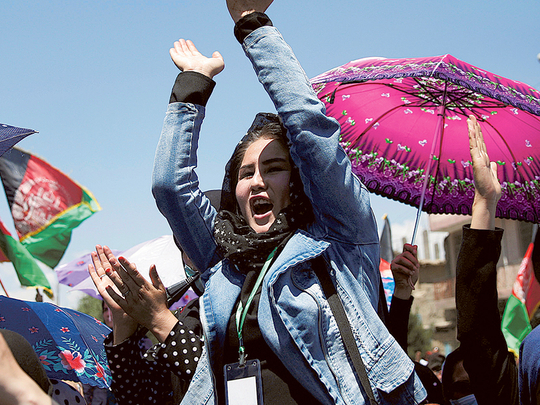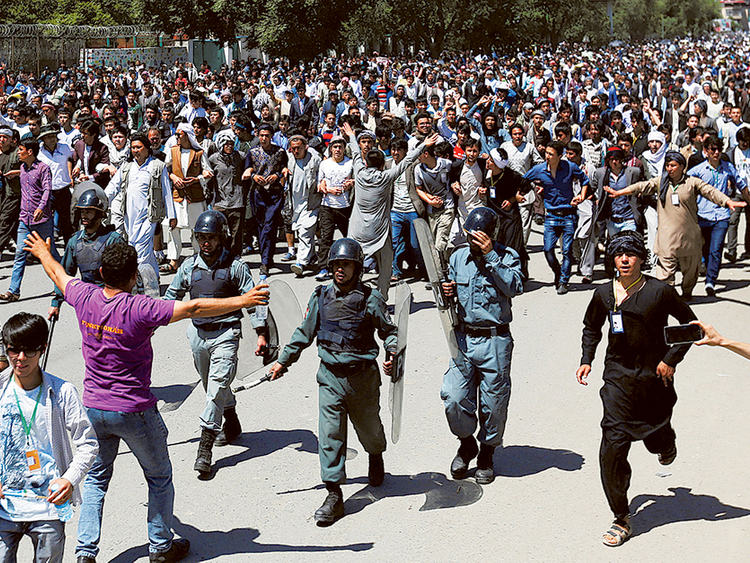
Kabul: Tens of thousands of minority Shiite Hazaras marched through the streets of the Afghan capital on Monday to protest at the proposed route for a major power transmission line, in a brewing political crisis for the beleaguered government.
Security forces locked down central Kabul, blocking key intersections with stacked shipping containers as the protesters marched on the presidential palace — demanding that the line linking energy-rich Central Asia pass through a central Hazara-dominated area in Afghanistan.
The demonstration highlights the war-torn nation’s turbulent politics. It follows one of the biggest anti-government rallies for years last November, which was sparked by the beheading of a group of Hazaras.
Some protesters threw stones at officials and banged on the sides of containers but the demonstration was largely peaceful.
“(President) Ashraf Gani is hiding himself behind blast walls,” Dawood Naji, a Hazara leader, told flag-waving demonstrators, drawing rousing applause.
“We can break down these containers if we want but we are here to protest in a civilised way for our rights.”
Authorities shut down roads to the presidential palace, fearing a repeat of the violence in November when protesters tried to storm the compound.
The 500-kilovolt TUTAP power line, which would connect the Central Asian nations of Turkmenistan, Uzbekistan and Tajikistan with electricity-starved Afghanistan and Pakistan, is seen as a crucial infrastructure project.
But it has been mired in controversy, with leaders from the minority group demanding that the line be routed through Bamiyan which has a large Hazara population.
The line was originally set to pass through the central province but the government decided to reroute it through the mountainous Salang pass north of Kabul, saying the shorter route would speed up the project and save millions of dollars.
Hazara leaders in the ethnically divisive nation lashed out at the Pashtun president, saying the decision to reroute the line was a sign of discriminatory policies — a charge that Gani denies.
“Bamiyan has seen no development in 15 years (since the Taliban were toppled from power),” Hazara lawmaker Arif Rahmani told AFP.
“We are demanding justice, not charity.”
The rally comes in the midst of the Taliban’s annual spring offensive launched last month and authorities have warned that it could be targeted by insurgents.
“Staging peaceful protests is the civil right of every Afghan citizen,” the interior ministry said in a statement.
“We respectfully request that our countrymen not allow the enemy (to) misuse this opportunity and disrupt public security.”
The dispute, which highlights the challenges of modernising the country, threatens to overshadow the TUTAP project, which is due to be implemented by 2018 and could help ease nationwide blackouts.
Hazara protesters repeatedly heckled Ghani during an anti-corruption summit in London last week.
The president faces rising unpopularity amid endemic corruption, rampant unemployment and growing insecurity.
The three million-strong Afghan Hazara community has been persecuted for decades, with thousands killed in the late 1990s by Al Qaida and the mainly Pashtun and Sunni Taliban.
There has been a surge in violence against the community, with a series of kidnappings and killings in recent months that have triggered a wave of fury on social media.
Last November thousands of protesters marched coffins containing the decapitated bodies of seven Shiite Hazaras through the Afghan capital.
Their bodies were found in the southern province of Zabul, which is under Taliban control and has been the scene of clashes between rival militant factions.
Gani called the killings “the shared pain of a nation” and accused the militants of trying to divide Afghanistan.













